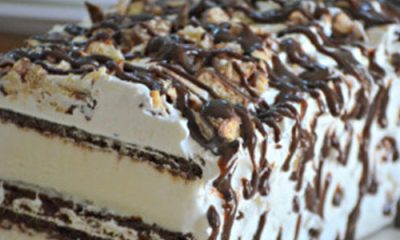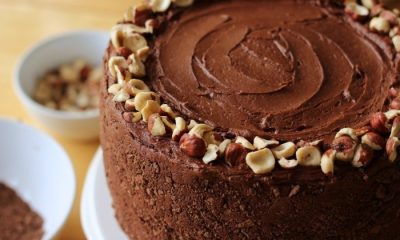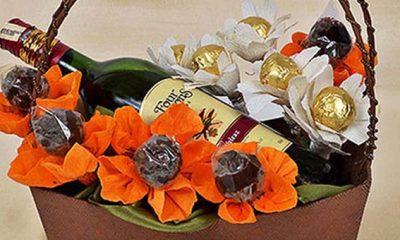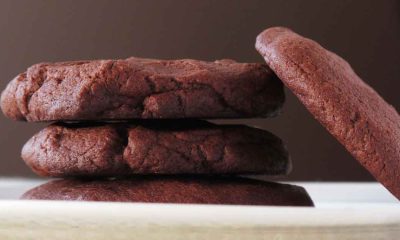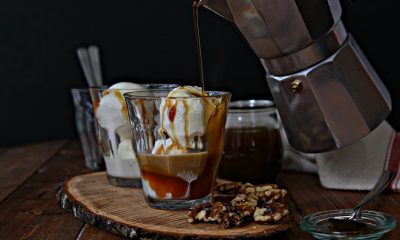Desserts
Contemporary Chestnut Montblanc Recipe
UNDER THIS SHINY glazed dome hides our interpretation of the Mont-Blanc, the typical French early winter dessert that celebrates sweet chestnuts. Here, layers of chestnut cream, mandarin marmalade, and vanilla bavarois sit on top of a chestnut biscuit. Candied chestnuts anchor the plate.
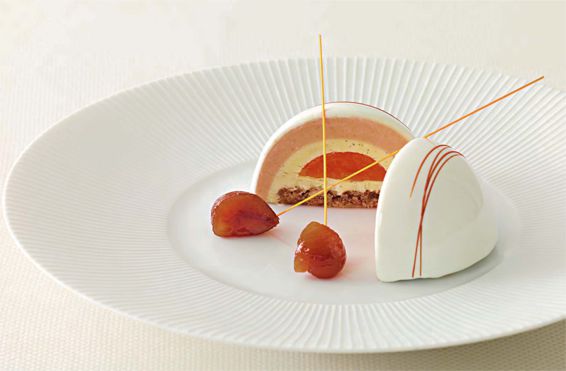
| Servings |
MetricUS Imperial
|
Ingredients
Chestnut Biscuit
- cup ¾plus 2½ tablespoons sugar
- cup ½flour
- cup ½chestnut flour
- tablespoon ¾baking soda
- teaspoon ⅓salt
- 1 egg
- 5 tablespoons ½Clarified Butter melted
- cup ½chestnut puree we recommend Clément Faugier
- 10 candied chestnuts drained well and finely chopped, we recommend Clément Faugier
Mandarin Jam
- 3 tablespoons plus 1 teaspoon sugar
- 1 teaspoon apple pectin
- 1 cup fresh mandarin orange juice
- 1 tablespoon glucose syrup
Vanilla Bavarois
- 4 sheets gelatin
- 3 tablespoons plus 1 teaspoon sugar
- 4 egg yolks
- cup ¾heavy cream
- cup ¾milk
- 1 Tahitian vanilla bean halved and seeds scraped
Chestnut Mousse
- 2 sheets gelatin
- 1 cups ⅓heavy cream
- 1 cup chestnut puree
- 2 tablespoons bourbon
- 2 tablespoons ½butter at room temperature
White Chocolate Glaze
- 5 ½ sheets gelatin
- 6 ounces chopped white chocolate we recommend Valrhona Ivoire 35%
- 1 cups ¼sugar
- 7 tablespoons glucose syrup
- cup ⅓condensed milk
- 1 drop white food coloring optional
To Finish
- Dark Chocolate Glaze optional
- 6 candied chestnuts strained
- 12 sticks Pulled Sugar optional
Ingredients
Chestnut Biscuit
Mandarin Jam
Vanilla Bavarois
Chestnut Mousse
White Chocolate Glaze
To Finish
|

|
Instructions
For the Chestnut Biscuit
- Preheat the oven to 350°F. Line a 9 × 13-inch rimmed baking sheet with a Silpat or parchment paper and spray with nonstick cooking spray. Sift the sugar, flour, chestnut flour, baking soda, and salt into the bowl of an electric mixer fitted with a paddle attachment. On medium speed, add the egg and stream in the melted butter until well combined. Add the chestnut puree, and then the candied chestnuts, and mix to incorporate well. Spread the batter in an even layer on the prepared baking sheet. Bake for 10 minutes, or until golden brown. Cool at room temperature, then chill in the refrigerator and, with a ring cutter, cut at least 6 circles slightly smaller than the circumference of 6 individual dome molds.
For the Mandarin Jam
- In a small bowl, mix the sugar with the pectin. In a small saucepan, bring the mandarin juice and glucose to a simmer. Add the sugar mixture, and simmer for 2 minutes, while whisking. Pour into at least 6 small Flexipan dome molds and freeze.
For the Vanilla Bavarois
- Be sure the mandarin jam domes are frozen solid before preparing the bavarois. Soak the gelatin sheets in ice water for 10 minutes; squeeze dry. In a medium heatproof bowl, whip the sugar and yolks to combine. In a small bowl, whip the cream to medium peaks. In a small saucepan, combine the milk, vanilla seeds, and vanilla pod and bring to a simmer. While whisking, gradually pour half of the hot milk into the egg yolk mixture. Gradually whisk the mixture back into the saucepan. Return the saucepan to medium heat and cook, while whisking, until it reaches 185°F. Remove from the heat, mix in the gelatin to dissolve, and strain through a fine-meshed sieve into a medium bowl. Cool to room temperature and fold in the whipped cream until no streaks remain. Scoop the bavarois into a piping bag with a large tip and fill one-third of at least 6 medium Flexipan dome molds (a 2.6-inch Flexipan half sphere form was used for the photograph). Press a frozen mandarin dome onto the surface of the bavaroise and pipe the remaining bavaroise on top to coat. Lightly press a piece of biscuit onto the mousse until flush with the rim of the mold. Smooth the tops with an offset spatula. Freeze until set, about 1 hour.
For the Chestnut Mousse
- Be sure the bavarois domes are frozen solid before preparing the mousse. Soak the gelatin sheets in ice water for 10 minutes; squeeze dry. In a medium bowl, whip 1 cup of the heavy cream to soft peaks; cover and keep chilled.
- In a medium saucepan over medium heat, combine the chestnut puree with the remaining ⅓ cup of heavy cream. Stir until combined and the paste reaches a simmer. Remove from the heat and mix in the gelatin, bourbon, and butter; cool to room temperature. Transfer the mixture to a large bowl and fold in the whipped cream until no streaks remain.
- Transfer to a piping bag and fill one-third of at least 6 large dome molds (a 3-inch Flexipan half sphere form was used for the photograph). Press a frozen bavaroise dome into the center of each until the biscuit is level with the top of the mold, and pipe more mousse around the edges if needed to fill. Spread the mousse with an offset spatula until flush with the rim to form the bombes. Freeze until solid.
For the White Chocolate Glaze
- Soak the gelatin sheets in ice water for 10 minutes; squeeze dry. Fill one-third of a medium saucepan with water and bring to a simmer. Place the chocolate in a heatproof bowl, cover with plastic wrap, and set over the water. In a small saucepan, combine the sugar, glucose, and ½ cup plus 2 tablespoons of water and set over medium heat. Heat, stirring, until it reaches 221°F. Remove from the heat and stir in the condensed milk and gelatin. Remove the chocolate from the heat and stir in the liquid until well combined to make a glaze. Stir in the white food coloring, if using.
- Unmold the frozen bombes and set them on a rack set over a baking sheet. Cool the glaze to 95°F. Using a large ladle, pour the glaze onto the bombes, allowing it to coat all the way down the sides. Refrigerate the bombes for 4 hours to thaw before serving.
To Finish
- If using the chocolate glaze, transfer it to a heatproof bowl and warm in a microwave or over a saucepan of simmering water until it reaches 95°F. Transfer to a piping bag fitted with a small tip and drizzle over the bombes in a decorative fashion.
- For each serving, slice a bombe in half and set on a chilled dessert plate; slice a chestnut in half and use to garnish the plate. If using the sugar sticks, rest them against the dome.
- “It takes more than three months to candy the chestnuts that hide inside the classic Mont-Blanc, named for the pride of the Alps.”

